The international day on Thursday highlights that theme, as well as the importance of recognition, justice and development opportunities for those of African descent, said Secretary-General António Guterres.
He said the results of entrenched racism continue to be devasting: “opportunities stolen; dignity denied; rights violated; lives taken and lives destroyed.”
The African diaspora faces a unique history of systemic and institutionalized racism, and profound challenges, he continued.
“We must respond to that reality – learning from, and building on, the tireless advocacy of people of African descent. That includes governments advancing policies and other measures to eliminate racism against people of African descent.”
Racist algorithms
He also singled out the recent controversy involving some artificial intelligence tools which have reportedly been unable to eliminate racist tropes and stereotypes from even highly advanced algorithms, calling on tech firms to “urgently” address racial bias in AI.
In a joint statement a group of independent UN Human Rights Council-appointed experts said the international day was a time to take stock of “persistent gaps” in the effort to protect hundreds of millions whose human rights continue to be violated due to racial discrimination.
“It is also an opportunity to recommit to our promise to fight all forms of racism everywhere.”
They noted that racism, racial discrimination, xenophobia, and related intolerance continue to be a cause of conflict worldwide.
“We are witnessing a dangerous regression in the fight against racism and racial discrimination in many spaces”, the experts said.
“Minorities, people of African descent, people of Asian descent, Indigenous Peoples, migrants, including asylum seekers and refugees, are particularly vulnerable as they often face discrimination in all aspects of their lives based on their racial, ethnic or national origin, skin colour or descent.”
States must implement international rights obligations, conventions, and declarations to which they are a party, they added. Special Rapporteurs and other rights experts are independent of the UN or any government, and receive no salary for their work.
Tackle methane emissions now, to slow global warming
Tackling emissions of methane now, is essential to meet the Paris Agreement goal of limiting global warming to 1.5°C above pre-industrial levels by 2050, according to a new report issued by the UN-backed Global Methane Forum on Wednesday.
The Forum is meeting in Geneva, hosted by the UN Economic Commission for Europe, the UN Environment Programme-convened Climate and Clean Air Coalition and other partners.
Political momentum is building towards methane mitigation and new technology is allowing more accurate measurement, revealing the urgent need to turn commitment into real cuts, the Forum said in a press release.
Nearly 500 participants from across the world have been sharing success stories to catalyze methane emission reductions in line with the Global Methane Pledge, which aims to reduce emissions by at least 30 per cent from 2020 levels up to end of this decade. It now has 157 countries and the European Union on board.
A powerful greenhouse gas, methane has a warming effect over 80 times greater than CO2 over a 20-year timeframe, which means action to cut emissions now can unlock significant near-term benefits for climate action.
The gas is responsible for around 30% of total warming since the Industrial Revolution and is the second largest contributor to global warming after CO2.
Turning pledges into action
UNECE Executive Secretary Tatiana Molcean opened the plenary session on Tuesday by making a global call to mobilize more ambitious action: “Hand in hand with decarbonization of energy systems, methane emissions need to be addressed in governments’ plans for stronger climate action.”
Meeting the Global Methane Pledge goals could reduce global warming by at least 0.2° C by 2050.
“In view of the devastation and suffering caused by extreme weather events, in particular in the most vulnerable countries, the world can simply not afford to miss this opportunity”, she added.
Mpox deaths falling everywhere but Africa, says expert panel
Cases of Mpox are falling everywhere except in Africa, a UN health agency expert panel has said, warning that the virus is causing “high mortality” in children under 15 years old.
The Strategic Advisory Group of Experts on Immunization meeting in Geneva to advise the World Health Organization (WHO) noted that the African Mpox strain appears to have a different genetic blueprint to other outbreaks reported around the world.
Experts on the panel highlighted the need to monitor and find the source of an ongoing outbreak of Mpox in the Democratic Republic of the Congo which has been linked to 265 deaths.
WHO’s Dr Kate O’Brien said the agency was encouraging countries to be proactive, “in particular the Democratic Republic of Congo, to have access to the vaccine, to use the vaccine and to do evaluations of the vaccine performance, which we expect to be very high.”
Vaccines should be used in at-risk communities and in non-high risk populations, the panel said.
But experts highlighted the problems caused by poor vaccine access in parts of Africa and urged greater investment in vaccine research on M-pox.
The WHO announced that Mpox was no longer a public health emergency last May.
Demand for peacebuilding outstrips supply
Amidst an intensification and multiplication of crises, the demand for support to UN peacebuilding continues to outstrip supply, the Secretary-General said in a new report published on Wednesday.
“The wars grabbing the headlines today only underscore the need to invest now in sustainable peace for tomorrow”, said António Guterres.
Covering the period from 1 January to 31 December, the report highlights that in 2023 the Peacebuilding Fund approved over $200 million for projects in 36 countries and territories, including for women’s and youth empowerment.
Redouble peacebuilding efforts
While the decision of the General Assembly to provide assessed contributions to the Fund starting in 2025 marked a milestone, the Fund reached its lowest liquidity level since its inception due to a decline in contributions last year.
“This is a time to redouble, not diminish, peacebuilding efforts”, said Assistant-Secretary General for Peacebuilding Support Elizabeth Spehar.
“This year’s report shows again that peacebuilding works: stronger institutions and inclusive dialogues help break and prevent cycles of violence.”











